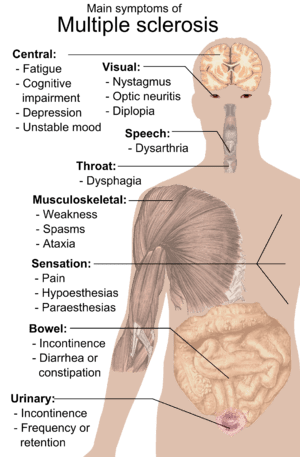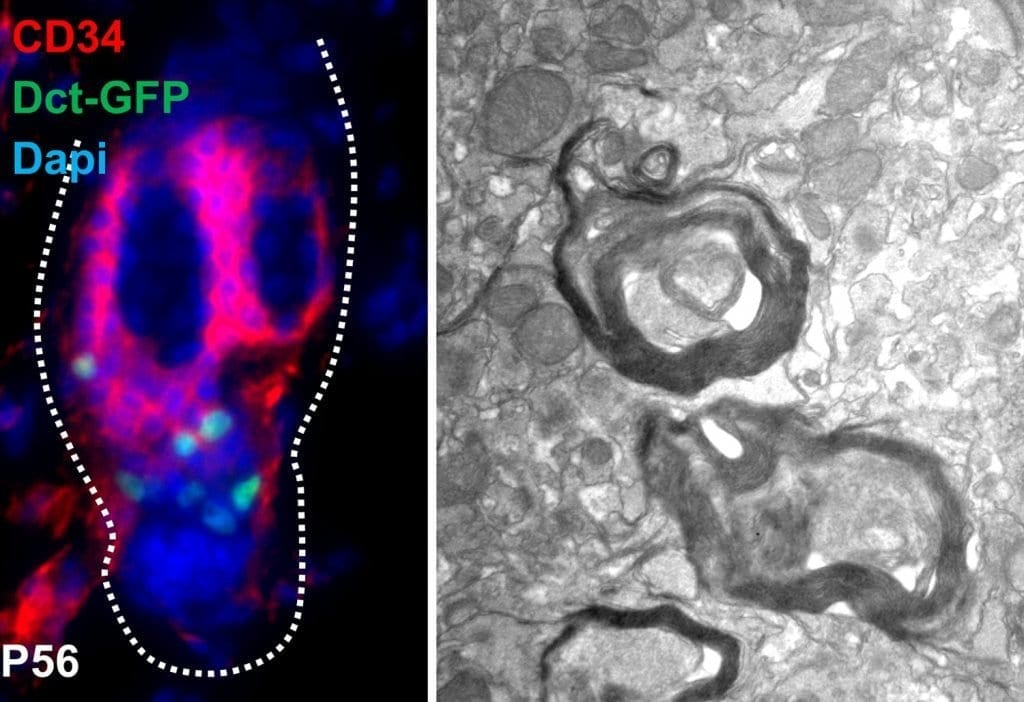
A diagnosis of multiple sclerosis (MS) is a hard lot.
Patients typically get the diagnosis around age 30 after experiencing a series of neurological problems such as blurry vision, wobbly gait or a numb foot. From there, this neurodegenerative disease follows an unforgiving course.
Many people with MS start using some kind of mobility aid — cane, walker, scooter or wheelchair — by 45 or 50, and those with the most severe cases are typically bed-bound by 60. The medications that are currently available don’t do much to slow the relentless march of the disease.
In search of a better option for MS patients, a team of UW-Madison biochemists has discovered a promising vitamin D-based treatment that can halt — and even reverse — the course of the disease in a mouse model of MS. The treatment involves giving mice that exhibit MS symptoms a single dose of calcitriol, the active hormone form of vitamin D, followed by ongoing vitamin D supplements through the diet. The protocol is described in a scientific article that was published online in August in the Journal of Neuroimmunology.
“All of the animals just got better and better, and the longer we watched them, the more neurological function they regained,” says biochemistry professor Colleen Hayes, who led the study.
MS afflicts around 400,000 people nationwide, with 200 new cases diagnosed each week. Early on, this debilitating autoimmune disease, in which the immune system attacks the myelin coating that protects the brain’s nerve cells, causes symptoms including weakness, loss of dexterity and balance, disturbances to vision, and difficulty thinking and remembering. As it progresses, people can lose the ability to walk, sit, see, eat, speak and think clearly.
Current FDA-approved treatments only work for some MS patients and, even among them, the benefits are modest. “And in the long term they don’t halt the disease process that relentlessly eats away at the neurons,” Hayes adds. “So there’s an unmet need for better treatments.”
While scientists don’t fully understand what triggers MS, some studies have linked low levels of vitamin D with a higher risk of developing the disease. Hayes has been studying this “vitamin D hypothesis” for the past 25 years with the long-term goal of uncovering novel preventive measures and treatments. Over the years, she and her researchers have revealed some of the molecular mechanisms involved in vitamin D’s protective actions, and also explained how vitamin D interactions with estrogen may influence MS disease risk and progression in women.
In the current study, which was funded by the National Multiple Sclerosis Society, Hayes’ team compared various vitamin D-based treatments to standard MS drugs. In each case, vitamin D-based treatments won out. Mice that received them showed fewer physical symptoms and cellular signs of disease.
The Latest Bing News on:
Multiple Sclerosis
- Multiple sclerosis patients are sensitive to heat: Tips to help themon May 1, 2024 at 10:53 am
Strategies include swimming, stress techniques, and nutrition for improved symptom management during summer. Multiple sclerosis (MS) is a chronic autoimmune condition where the immune system attacks ...
- Office Support Volunteers Needed for National Multiple Sclerosis Societyon May 1, 2024 at 1:05 am
Texas MS150, all our supplies and items are slowly making their way back to our office (1050 N. Post Oak Rd. Ste 240 Houston, TX 77055) This ...
- Finley siblings share their fight against Multiple Sclerosis, encourages people to get checkedon April 30, 2024 at 7:33 am
According to the National Multiple Sclerosis Society, almost one million Americans live with Multiple Sclerosis (MS), an auto-immune condition that affects the central nervous system. According to ...
- ‘Liquid gold’ could bring new hope to multiple sclerosis patients, study suggests: ‘Profound benefit’on April 30, 2024 at 2:30 am
An experimental medication called CNM-Au8 — a drinkable liquid with gold nanocrystals — has shown promising results in clinical trials for improving MS symptoms. Doctors and researchers weighed in.
- Multiple sclerosis discovery could be a breakthroughon April 29, 2024 at 5:00 pm
We’ve made significant progress in developing better treatments for multiple sclerosis over the past two decades. Yet the medical community still struggles to diagnose the neurological condition, let ...
- Lisa Jarvis: This multiple sclerosis discovery could be a breakthroughon April 29, 2024 at 10:43 am
We’ve made significant progress in developing better treatments for multiple sclerosis over the last two decades. Yet the medical community still struggles to diagnose the neurological condition, let ...
- Tiziana Life Sciences Announces Additional Clinical Improvements Among Multiple Sclerosis Patients in its Expanded Access Programon April 22, 2024 at 4:12 am
All Patients Have Either Stabilized or Improved on Nasal Foralumab Treatment and No Patients Declined in Key Clinical Measures NEW YORK, April 22, 2024 (GLOBE NEWSWIRE) -- Tiziana Life Sciences, Ltd.
- This Multiple Sclerosis Discovery Could Be a Breakthroughon April 20, 2024 at 5:00 am
A new blood test reveals signs of the disease years before symptoms occur. It could change how MS is diagnosed, treated and studied.
- Blood test may identify who is at risk for developing multiple sclerosison April 19, 2024 at 7:49 am
An early marker of multiple sclerosis could help doctors figure out who will eventually fall prey to the degenerative nerve disease, a new study says.
- Signs of multiple sclerosis can be detected in blood 5 years before symptoms appear, new study finds. Here's why this breakthrough is important.on April 19, 2024 at 2:00 am
What you need to know about the study, as well as who is most at risk for multiple sclerosis and early signs to look out for.
The Latest Google Headlines on:
Multiple Sclerosis
[google_news title=”” keyword=”Multiple Sclerosis” num_posts=”10″ blurb_length=”0″ show_thumb=”left”]
The Latest Bing News on:
Vitamin D-based treatment
- Updated Vitamin D and Calcium Recommendationson April 23, 2024 at 5:00 pm
The major therapeutic uses of vitamin D include treatment of nutritional or metabolic rickets; osteomalacia, particularly in the setting of chronic renal failure; hypoparathyroidism; and osteoporosis.
- Homeopathy for psoriasis vs. allopathyon April 21, 2024 at 5:00 pm
A 2019 case report describes six cases where people recovered from a psoriasis flare-up or an associated skin infection after receiving homeopathic treatment. However, this is a small number of ...
- Why Does Joint Pain Get Worse Around Menopause?on April 17, 2024 at 5:00 pm
Joint pain is very common during menopause and may be related to lower levels of estrogen. Exercising frequently, eating anti-inflammatory foods, and other actions may help reduce the pain. Share ...
The Latest Google Headlines on:
Vitamin D-based treatment
[google_news title=”” keyword=”vitamin D-based treatment” num_posts=”10″ blurb_length=”0″ show_thumb=”left”]










